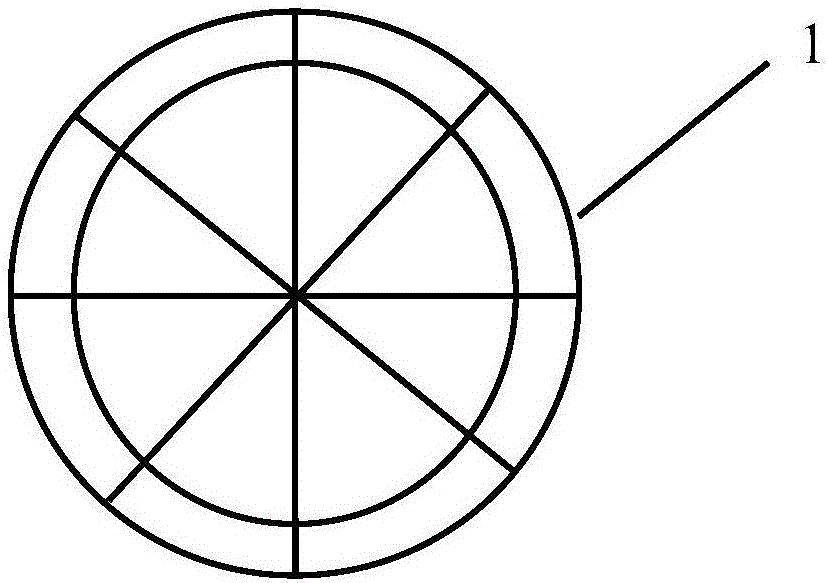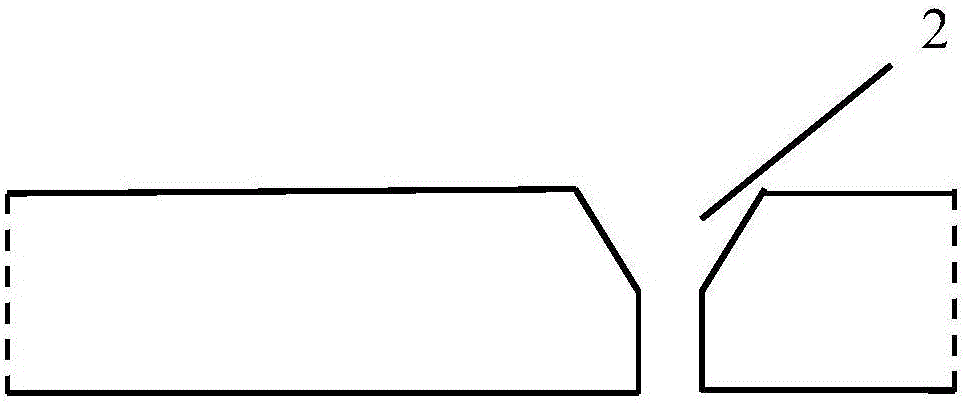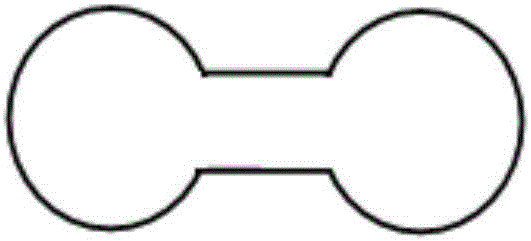Acrylic fibers with peanut-shaped cross section and production method thereof
A technology of acrylic fiber and production method, which is applied in the directions of fiber processing, fiber chemical characteristics, wet spinning method, etc., can solve the problem that it is difficult to ensure the uniformity of fiber tows, the time for adjusting the movement of polymer molecular chains is short, and the spinneret holes Problems such as small hole spacing, to achieve superior moisture wicking ability, good capillary effect, and the effect of improving bulkiness
- Summary
- Abstract
- Description
- Claims
- Application Information
AI Technical Summary
Problems solved by technology
Method used
Image
Examples
Embodiment 1
[0041] The method for producing peanut type section acrylic fiber comprises the steps:
[0042] S1: Spinning forming: the polyacrylonitrile dry powder with a molecular weight of 60000-80000 is obtained by copolymerizing acrylonitrile with a mass percentage of 91% and vinyl acetate with a mass percentage of 9%, and the dry polyacrylonitrile powder is dissolved in dimethyl acetonitrile A spinning stock solution with a mass percentage concentration of 23% is formed in the amide solvent, and the spinning stock solution is heated to 82°C and extruded from the holes of the spinneret, and formed into nascent fibers by double diffusion in the coagulation bath;
[0043] Wherein, the temperature when the spinning dope enters the coagulation bath is 80°C, the temperature of the coagulation bath is 30°C, the concentration of dimethylacetamide solvent in the coagulation bath is 45%, and the circulation rate is 30kL / h;
[0044] The spinneret is a rectangular plate or a circular plate, made ...
Embodiment 2
[0049] The method for producing peanut type section acrylic fiber comprises the steps:
[0050] S1: Spinning forming: the polyacrylonitrile dry powder with a molecular weight of 70000-90000 is prepared by copolymerizing acrylonitrile with a mass percentage of 92% and vinyl acetate with a mass percentage of 8%, and the dry polyacrylonitrile powder is dissolved in dimethyl acetonitrile A spinning stock solution with a mass percentage concentration of 24% is formed in the amide solvent, and the spinning stock solution is heated to 84°C and extruded from the holes of the spinneret, and formed into nascent fibers by double diffusion in the coagulation bath;
[0051] Among them, the temperature of the spinning dope entering the coagulation bath is 86°C, the temperature of the coagulation bath is 32°C, the concentration of dimethylacetamide solvent in the coagulation bath is 48%, and the circulation volume is 31kL / h;
[0052] The spinneret is a rectangular plate or a circular plate, ...
Embodiment 3
[0057] The method for producing peanut type section acrylic fiber comprises the steps:
[0058] S1: Spinning forming: the polyacrylonitrile dry powder with a molecular weight of 80,000-100,000 is obtained by copolymerizing acrylonitrile with a mass percentage of 94% and vinyl acetate with a mass percentage of 7%, and the dry polyacrylonitrile powder is dissolved in dimethyl acetonitrile. A spinning stock solution with a mass percentage concentration of 25% is formed in the amide solvent, and the spinning stock solution is heated to 86°C and extruded from the holes of the spinneret, and formed into nascent fibers by double diffusion in the coagulation bath;
[0059] Wherein, the temperature of the spinning dope entering the coagulation bath is 90°C, the temperature of the coagulation bath is 36°C, the concentration of dimethylacetamide solvent in the coagulation bath is 50%, and the circulation volume is 33kL / h;
[0060] The spinneret is a rectangular plate or a circular plate,...
PUM
| Property | Measurement | Unit |
|---|---|---|
| diameter | aaaaa | aaaaa |
| softening point | aaaaa | aaaaa |
Abstract
Description
Claims
Application Information
 Login to View More
Login to View More - R&D
- Intellectual Property
- Life Sciences
- Materials
- Tech Scout
- Unparalleled Data Quality
- Higher Quality Content
- 60% Fewer Hallucinations
Browse by: Latest US Patents, China's latest patents, Technical Efficacy Thesaurus, Application Domain, Technology Topic, Popular Technical Reports.
© 2025 PatSnap. All rights reserved.Legal|Privacy policy|Modern Slavery Act Transparency Statement|Sitemap|About US| Contact US: help@patsnap.com



